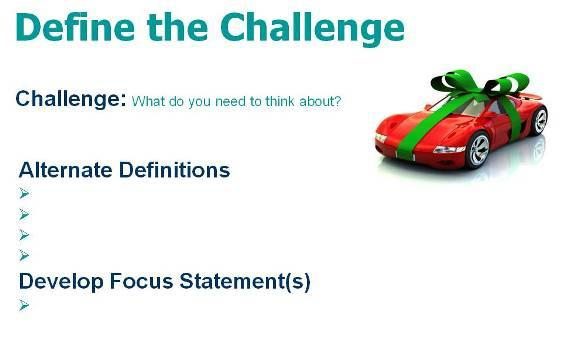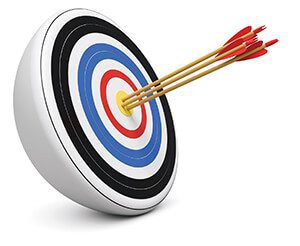 Define Your Challenge to Focus Creative Thinking
Define Your Challenge to Focus Creative Thinking
When you have something to think about (see Areas of Opportunity) using critical thinking, the most important step is to define your challenge clearly using Open or Target Focus. Being clear on the focus for your thinking, particularly when working in teams, significantly enhances the breadth, depth, quality and speed of what you come up with.
To start you may want to think about something from your Red Car List, or perhaps a challenge has just emerged that requires attention. Where you have something specific to think about – that is where there is a clear purpose for the thinking, you will develop a Target Focus. For example a target focus may be ‘Generate ideas to overcome customer price objections during the sale of our older products’. This focus has a clear target.
An Open Focus is also very useful when you don’t have a specific purpose for the thinking (there is always a reason for the thinking, but not necessarily a specific target). For example ‘Explore ideas in the area of advanced eLearning to expand our market’. This Focus clearly has a reason behind it, but there is no definite target.
Another important part of setting your Focus is to be open to changing it. In fact this is vital to good creative thinking. There is always more than one way to see a challenge, and by coming up with multiple definitions for a challenge, you are thinking divergently which is the vital first aim of Deliberate Creative Thinking.
So when you have something that needs critical thinking, the process is to:
- Write down the starting challenge, problem, task, opportunity as it first appears
- Seek and write down other ways of wording or seeing the starting challenge
- Select one or more (not too many) different ways of looking at the starting challenge that might be useful to pursue
- Switch these useful challenges into positive action oriented Focus Statements
- Work through each Focus Statement using more critical and creative thinking tools as needed
- Starting challenge is: we are having difficulty attracting attendees to a public workshop in Perth, due to a lack of database contacts there.
- Other ways of seeing this challenge could be:
- Perth is a city we currently have few event prospects in
- We don’t know how to attract participants other than through our database
- We are not well known in Perth, so attracting participants is difficult
- Our services are not appreciated in Perth, hence our lack of contacts there
- We are weak in opening up new cities for our programs
- etc, etc. list as many of these as you like, until you have several quite different ones
- Useful challenges we may want to pursue are (note you can reword here):
- We don’t have a strategy or skill in attracting people beyond using our database
- We don’t know how to build a prospects database in new cities we want to work in
- etc, etc. I suggest having 3-4 really useful challenges/opportunities to start
- Focus Statements for the above challenges could be:
- Generate ideas and develop strategies to attract people to our Perth workshops beyond using our current database, and build the prospects database to improve the success of future workshops.
- note… I have combined the challenges into a Focus Statement that gives short and long term benefit.
- With this Target Focus Statement you are more targeted on what you are thinking about, and therefore more likely to generate many more useful ideas as you move forward. Note also that Step 2 has also given you other ways of thinking about the challenge that will come into play as your do your thinking, so nothing is wasted in this process.
Positive action oriented Focus Statements that fully serve their purpose are designed using a three stage process:
- Start with an action thinking verb (see attached template)
- Clearly state your purpose for the thinking – what you want from it
- Add a qualifier to state why you want what you want from the thinking
An example of designed Focus Statement could be:
- Generate (thinking verb) ideas to attract participants to our Perth workshops (what we want), in order to make a profit on these workshop and also build our database of prospects for future workshops (our longer term why).
By having a Focus Statement like this you stay on target for what you want now, while always remembering the long-term goals. Good luck with these.

